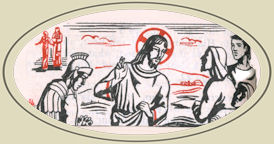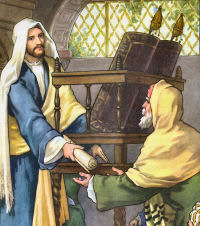» Enjoy our Liturgical Seasons series of e-books!
"Jesus returned to Galilee in the power of the Spirit, and news of him spread throughout the whole region. He taught in their synagogues and was praised by all (Luke 4:14-15)."
The feast of St. Angela Merici, which is ordinarily celebrated today, is superseded by the Sunday liturgy.
Click here for commentary on the readings in the 1962 Missal of the Roman Rite.
The Week of Prayer for Christian Unity
Sunday Readings
The first reading is taken from the Book of Nehemiah, 8:2-4a, 5-6, 8-10. Nehemiah and Ezra lived in the time when the people of Israel had been returned to their land after the years of the Babylonian Captivity and it was a time of rebuilding. The people had lost their connections to their faith.
The second reading is from the first Letter of St. Paul to the Corinthians, 12:12-30 and refers to the Mystical Body of Christ. St. Paul concludes his description of the different parts of the body by applying it to the Church, where variety of functions does not detract from unity.
The Gospel is from St. Luke 1:1-4; 4:14-21. In the first four verses of St. Luke's Gospel which have been read to you today, you will find reason to be grateful to him. He went to a lot of trouble in order to put in a permanent form, in a written record, the essential facts concerning Christ, his words and his works, so that we "would understand (like Theophilus) the certainty of the faith in which we have been instructed."
But while we must be grateful to St. Luke, we owe a bigger debt of gratitude still to the all-good, all-wise God who moved Luke and the other Evangelists to preserve for us in writing the essential truths of the Christian faith that has been handed down to us.The Apostles were companions of Christ. They witnessed his works and his words; they remembered most of his doings and his sayings, and what they might have forgotten the Holy Spirit recalled to their memory on that first Pentecost day in Jerusalem. The first two generations of Christians received the facts of the faith from these eye-witnesses and the miracles so frequent in the infant Church were confirmation of the truth of their teaching.
But God in his wisdom provided for the many generations to come who would not have this evident confirmation of their faith. He established a teaching body in his Church which would safeguard the purity of the Christian truths, for "he himself would be with it all days," and he gave us a written record of the facts of the faith in the Gospels and the ether writings of the New Testament.
How can we ever thank God sufficiently for his thoughtfulness in our regard? We Christians of today can be as certain, as assured, of the truth of the faith that we are trying to practice as was St. Luke who was converted by St. Paul. We have a living, teaching Magisterium in the Church, which authentically preserves and interprets for us the true facts of Christ's teaching and works as written down for us by a first-generation Christian under the impulse and guidance of God's Holy Spirit. If we needed further proof of the priceless value of our New Testament Books, the virulent attacks on their authenticity, on their objectivity, and on their veracity, by enemies of the faith down to and including our own day, should be sufficient.
But they have stood the test of time and the onslaughts of biased, prejudiced criticism, for they are the word of truth, which is eternal, and comes from God.
We have a priceless gift of God in the inspired Books of the Bible. Let us show true appreciation for that gift by using it to build up a better knowledge of the Christian faith which it teaches us. There should be a Bible, or at least the New Testament, in every Christian home. It should not be an ornament on a shelf, but a fountain and source from which we can draw strength and refreshment in the daily practice of our Christian faith. Almost two thousand years ago, God's infinite goodness provided this source of strength, the "fountain of living water," for us Christians of this century. Are we grateful for his thoughtfulness? Are we nourishing our faith at this blessed fountain of his infinite wisdom and love?
—Excerpted from The Sunday Readings by Fr. Kevin O'Sullivan, O.F.M.

The Week of Prayer for Christian Unity
Day Seven: "Give me to drink" (John 4:7) God of life, who cares for all creation, and calls us to justice and peace, may our security not come from arms, but from respect. May our force not be of violence, but of love. May our wealth not be in money, but in sharing. May our path not be of ambition, but of justice. May our victory not be from vengeance, but in forgiveness. May our unity not be in the quest of power, but in vulnerable witness to do your will. Open and confident, may we defend the dignity of all creation, sharing, today and forever, the bread of solidarity, justice and peace. This we ask in the name of Jesus, your holy Son, our brother, who, as victim of our violence, even from the heights of the cross, gave forgiveness to us all. Amen.
Commentary for the Readings in the 1962 Roman Missal:
Third Sunday after Epiphany
 "Only say the word, and my servant will be healed" (Gospel).
"Only say the word, and my servant will be healed" (Gospel).
By a twofold display of His mercy Jesus first confirmed His Divinity before the Jewish priests when He cleansed the despised leper (picture in background), then before the Gentiles by curing the centurion's paralyzed servant. We, too, publicly profess faith in His Divinity by our mercy in taking "the words of grace" to leprous, paralyzed sinners (Communion Verse).
What kind of mercy? St. Paul outlines certain practices in the Epistle: refrain from rendering "evil for evil;" "provide good things" to "all men;" peace to our enemy, leaving "vengeance" to God Who know how to "repay."
—Excerpted from My Sunday Missal, Confraternity of the Precious Blood






